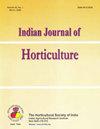Integrated nutrient management in cape gooseberry
Q4 Agricultural and Biological Sciences
引用次数: 0
Abstract
Excessive use of inorganic fertilizers may lead to health hazards, ecological vulnerabilities and deteriorationof soil health. Hence, the present experiment was conducted to substitute the mineral fertilizers with biofertilizersin cape gooseberry by maintaining the yield potential and soil fertility status. Cape gooseberry plants were treatedwith Azotobacter, phosphate solubilizing bacteria (PSB) and potassium solubilizing bacteria (KSB) @ 10 g plant-1each with a reduced dose of recommended fertilizer (RDF) from 100 to 60%. The highest yield was recorded with90% RDF + Azotobacter, PSB and KSB treatment, which was statistically at par with 60% RDF + Azotobacter, PSBand KSB treatment. Fruit weight was also increased significantly in 60-90% RDF + Azotobacter, PSB and KSBtreated plants. The best quality fruits were obtained in 60% or 90% RDF + Azotobacter, PSB and KSB treated plants.From the experimental findings, it can be concluded that the integrated nutrient module comprised of 60% RDFof NPK + Azotobacter, PSB and KSB @ 10 g plant-1 proved best treatment to improve the production of qualityfruits in cape gooseberry.猕猴桃的营养综合管理
过量使用无机肥料可能导致健康危害、生态脆弱性和土壤健康恶化。因此,本试验在保持醋栗产量潜力和土壤肥力状况的前提下,采用生物肥料替代矿质肥料。以固氮菌、磷酸增溶菌(PSB)和钾增溶菌(KSB)各10 g plant-1处理醋栗植株,并将推荐肥料(RDF)的用量从100减少到60%。90% RDF + Azotobacter, PSB和KSB处理的产量最高,与60% RDF + Azotobacter, PSBand KSB处理的产量相当。60-90% RDF +固氮菌、PSB和ksb6处理的植株果实重显著增加。用60%或90%的RDF +固氮菌、PSB和KSB处理的植株果实品质最好。综上所述,以氮磷钾+固氮菌、PSB和KSB @ 10 g plant-1为组合营养模组,是提高醋栗优质果实产量的最佳处理。
本文章由计算机程序翻译,如有差异,请以英文原文为准。
求助全文
约1分钟内获得全文
求助全文
来源期刊

Indian Journal of Horticulture
农林科学-园艺
CiteScore
0.50
自引率
0.00%
发文量
22
审稿时长
4-8 weeks
期刊介绍:
Information not localized
 求助内容:
求助内容: 应助结果提醒方式:
应助结果提醒方式:


